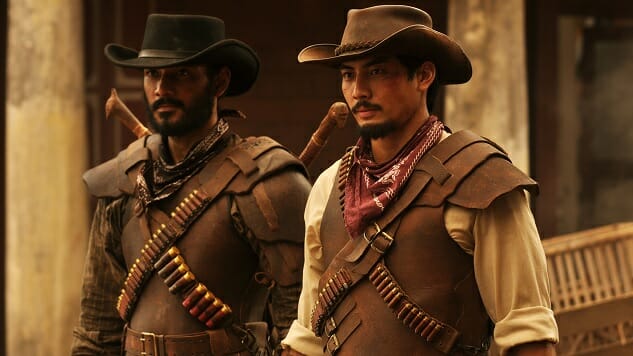Buffalo Boys

In September of last year, Singapore made the bold call to select Mike Wiluan’s Buffalo Boys as its entry for Best Foreign Language Film for this year’s Oscar celebrations, a play the Academy casually bricked with the release of its shortlist of 2019 contenders. A pity, really. Ranked among traditionally respectable, Best Foreign Language-y films, à la Cold War, Roma, Never Look Away or Shoplifters, the punch-happy quality of Buffalo Boys could have provided a much-needed palate cleanser, a reprieve from sophistication in exchange for enthusiastic ass-kicking.
Not that there isn’t a certain kind of sophistication to Wiluan’s filmmaking, or to the art of orchestrating ass-kicking on the big screen. Martial arts cinema’s foundation is built on history both richly composed and impeccably choreographed: Tsui Hark, King Hu, Zhang Yimou and Lau Kar-leung, for instance, value beauty in the construction of their films as much as they prize discipline and perfection in the filming of fight sequences. Buffalo Boys may not quite be a classic in the making, but it is a worthy update based on blueprints derived from both the martial arts and western genres. Ever hear the one about the two aggrieved brothers who ride into town looking for a piece of the evildoer who wronged their family? Of course you have.
In Buffalo Boys, the brothers are Jamar (Ario Bayu) and Suwo (Yoshi Sudarso), sons of a sultan killed decades prior during the invasion of Java. Their uncle, Arana (Tio Pakusadewo), fled with the infants strapped to his back, avoiding death at the hands of the evil Von Trach and fleeing to America. In the film’s present, Jamar, Suwo and Arana return to Java with retribution on their minds, six-shooters in their holsters, and martial prowess aplenty, ready to take out any bad guy fool enough to stumble into their path. Conventional wisdom suggests that it’s a bad idea to openly defy tyrants with more power than you, so the gang keeps it on the down low for as long as they can until, inevitably, their cover’s blown and they’re forced to fight in the open.
-

-

-

-

-

-

-

-

-

-

-

-

-

-

-

-

-

-

-

-

-

-

-

-

-

-

-

-

-

-

-

-

-

-

-

-

-

-

-

-








































